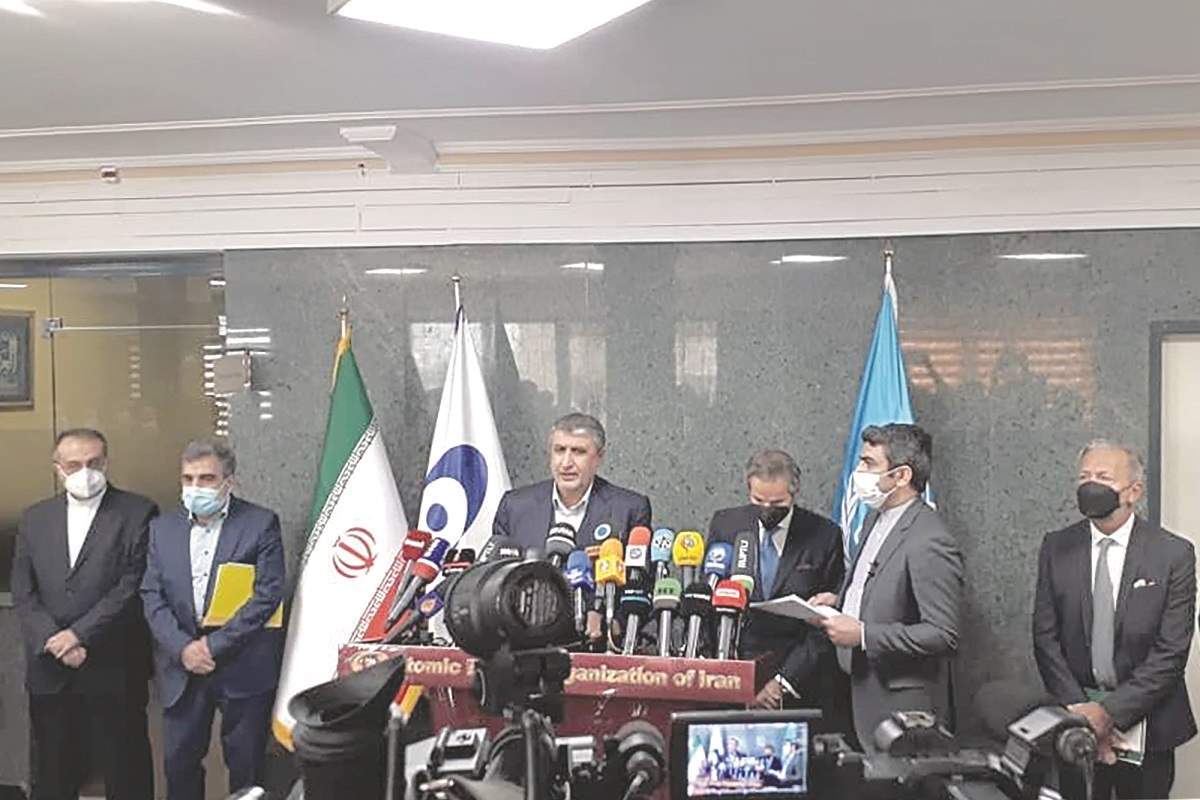Regardless of what happens when negotiators return to Vienna at the end of the month to try to find a way out of the deadlocked nuclear talks, there is little hope that the 2015 agreement will be revived.
اضافة اعلان
Three issues have dogged negotiators so far: Lifting all US sanctions imposed on Iran under the Trump administration before Iran returns to full compliance, a watertight commitment by the US that it will not withdraw from the deal in the future, and expanding the agreement so that Iran’s long-range missiles and drone systems can be curtailed.
 Director-General of the International Atomic Energy Agency Rafael Grossi (center right) and Head of the Atomic Energy Organization of Iran (AEOI) Mohammad Eslami (center left) give a press conference in Tehran, Iran, on November 23, 2021. (Photo: AEOI/AFP)
Director-General of the International Atomic Energy Agency Rafael Grossi (center right) and Head of the Atomic Energy Organization of Iran (AEOI) Mohammad Eslami (center left) give a press conference in Tehran, Iran, on November 23, 2021. (Photo: AEOI/AFP)
An exasperated US team is yet to agree on a Plan B if all fails. National Security Advisor Jake Sullivan suggested an interim agreement as a way out, one that was rejected by both Israel and Iran. US Secretary of State Anthony Blinken talked about exploring “other options” if negotiations fail. Aside from a clear military action, what else will keep Iran awake at night?
Israel, under Naftali Bennett, has stuck to its guns, rejecting any deal outright while threatening to launch a direct military strike if it feels that Tehran is close to building a nuclear bomb. The two sides have been engaged for months in a covert war that resulted in cyberattacks against sensitive Iranian installations, the assassination of the head of Iran’s nuclear program last year, Iranian drone attacks against Israeli vessels and counter cyberattacks, the last of which led to the leaking of secret Israeli material.
So far, Israeli provocations have failed to deter its archenemy. In fact, only a few weeks ago, the International Atomic Energy Agency revealed that Iran has enriched about 19 kg of uranium to 60 per cent purity, close to the 90 per cent level needed for nuclear weapons. An Iranian official boasted recently that his country has produced 210 kg of uranium enriched to 20 per cent and 25 kg to 60 per cent, a level that no country, apart from those with nuclear weapons, is able to produce.
The Biden administration will be attacked at home by the Republicans and the pro-Israel lobbies if it yields to Iranian demands and returns to the 2015 deal without extracting any concessions from Tehran.
US special envoy Robert Malley, who toured the region recently, failed to persuade Israeli officials to tone down their rhetoric. In fact, Bennett refused to meet him while his Foreign Minister Yair Lapid said that Iran was only buying time and its ultimate goal is to join the nuclear club at any price.
While little progress can be expected to happen in Vienna, there are factors that could affect the current stalemate. One, while Iran is sticking to its “strategic patience” policy, blaming the US for derailing the Joint Comprehension Plan of Action (JCPOA), sanctions are biting and domestic problems are putting pressure on the government of Ibrahim Raisi. How long the economy can hold is a matter of time.
Iran has been investing heavily in its proxies in Lebanon, Yemen, Iraq and Syria, and this has angered the Iranian people whose standard of living and access to public services have deteriorated.
Two, Israel cannot stage a lethal one-strike against Iran’s now entrenched nuclear facilities, without expecting a response, if not from Iran directly then from its Lebanese proxy. It is a dangerous gambit and Israel cannot expect its new Gulf allies to join it in an open military confrontation with Tehran.
And third, with the Biden administration moving away from the region, the so-called pivot to Asia, despite assurances to the contrary by US Defense Secretary Lloyd Austin in Manama recently, the urgency of concluding a deal with Tehran is apparent. It is not conceivable that the US is ready or willing to engage in yet another military adventure in the Middle East.
One can also assume that despite Russia’s close ties with Tehran, it will not accept to have a new nuclear power not far from its southern borders.
The most realistic, but not perfect, option will be to slap new sanctions on Iran and leave it there. And then, there are two possibilities: Iran will give in and seek to find a compromise or the hardliners will stick to their guns and the country will be closer than ever to building a nuclear weapon.
There is a poor track record when it comes to preventing other nations from joining the nuclear club: Israel in the 1960s, India and Pakistan in the 1990s and more recently North Korea. With the last, all the amorous overtures by Donald Trump had failed to dissuade Pyongyang’s strongman Kim Jung-un from bolstering his nuclear arsenal. And when it comes to strategic patience one should remember that it took Pakistan almost 20 years to carry out its first nuclear weapon test. For Iran, arriving at that goal will be much quicker.
Osama Al-Sharif is the editor-in-chief of Jordan News. This article was first published in Asianlite.com.
Read more Opinion and Analysis



